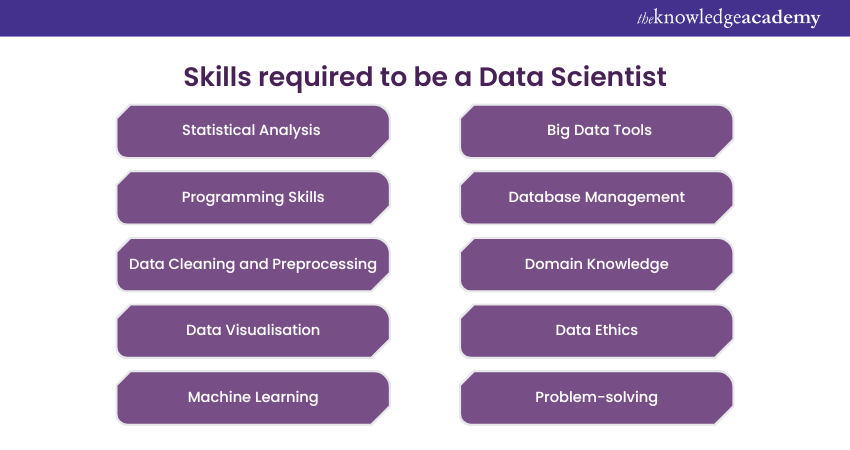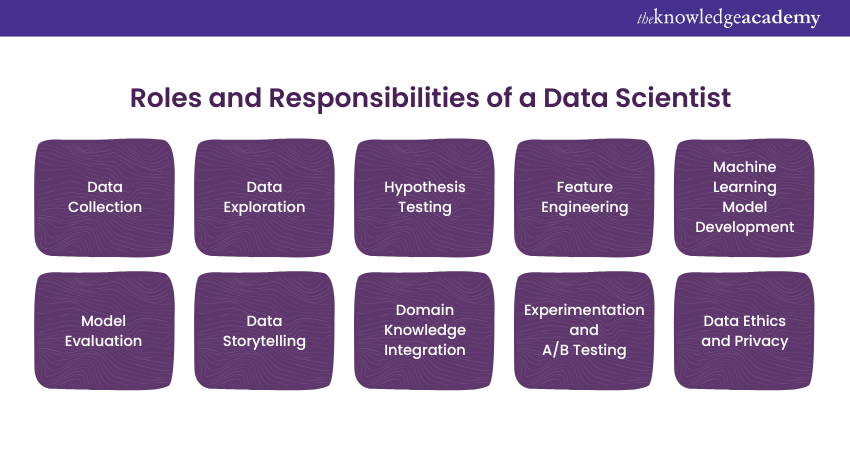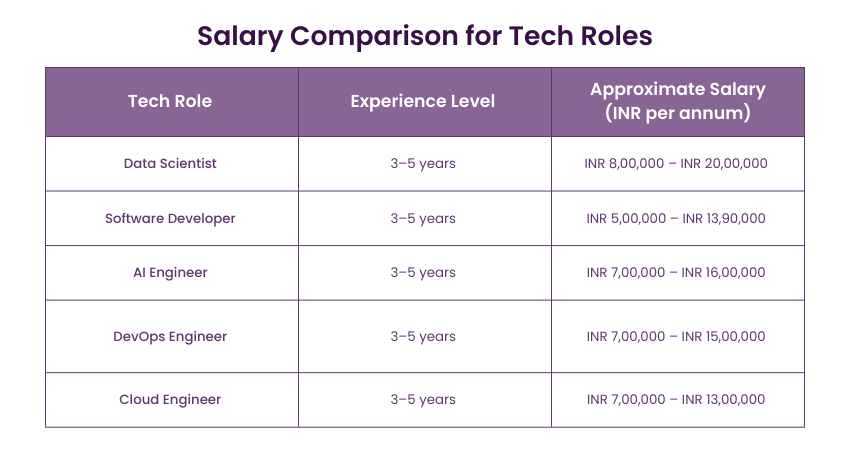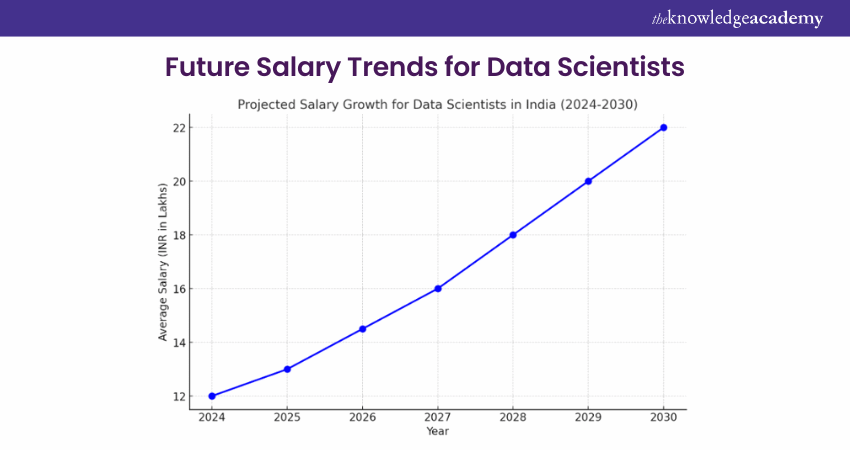We may not have the course you’re looking for. If you enquire or give us a call on 800969236 and speak to our training experts, we may still be able to help with your training requirements.
Training Outcomes Within Your Budget!
We ensure quality, budget-alignment, and timely delivery by our expert instructors.

Data is a modern-day organisation’s most precious resource. They want to make the most out of data by harnessing it to drive their operations, and this is why it is important to contextualise and analyse raw data. This is why the demand for Data Scientists is increasing, making the Data Scientist Salary in India particularly high.
According to Glassdoor, a Data Scientist earns an average annual salary of ₹700,000 to ₹20,00,000 in India. However, with the demand for Data Scientists increasing with every passing year, this number is only projected to increase. Thus, it’s crucial to gain salary insights before applying for a job in this field. So, read this blog to get insights into Data Scientist Salary in India, the skills required, their responsibilities and factors that determine their Salary.
Table of Contents
1) Who is a Data Scientist?
2) Skills required to be a Data Scientist
3) Roles and responsibilities of a Data Scientist
4) Salary Comparison: Data Scientist vs Other Tech Roles
5) Future Salary Trends for Data Scientists in India in 2025
6) Factors That Determine the Average Salary of a Data Scientist
7) Will AI Replace Data Science?
8) Is India Good for Data Scientist?
9) Conclusion
Who is a Data Scientist?
Data Scientists acquire and analyse large sets of structured and unstructured data. A Data Scientist’s job encompasses a blend of Computer Science, Statistics, And Mathematics. They are meant to interpret the outcomes of data analysis, processing, and modelling to help generate actionable plans for businesses and organisations.
Data Scientists are knowledgeable individuals in the fields of Mathematics and Statistics, and they have a strong grasp of concepts of Big Data and Machine Learning, among others. These professionals also have a perfect command of statistical software and programming, and their duties go beyond just processing and analysing data.
Data Scientists are analysts who use their knowledge of technology to identify and detect patterns and handle data. They identify solutions to business problems by combining their industry knowledge, contextual insight, and scepticism of already established assumptions.
Skills Required to be a Data Scientist
Let's have a look at the different skills that are required to be a Data Scientist:

Statistical Analysis
Statistical analysis is at the core of Data Science. Data Scientists need to understand various statistical concepts, such as Descriptive Statistics (mean, median, mode), Inferential Statistics (hypothesis testing, confidence intervals), and Regression Analysis. This knowledge helps in summarising data, making predictions, and drawing meaningful insights from datasets.
Programming Skills
Knowledge of programming languages such as Python and R is fundamental for a Data Scientist. These languages are widely used for data manipulation and the development of Machine Learning models. Being able to write clean, efficient code is essential for automating data tasks and building robust solutions.
Data Cleaning and Preprocessing
Raw data is often complex and inconsistent. Data Scientists must be skilled in data cleaning and preprocessing to ensure that the data is accurate and ready for analysis. This includes handling missing values, dealing with outliers, and transforming the data into a compatible format for analysis.
Data Visualisation
Data Scientists need to be adept at creating informative and visually appealing data visualisations. They must know how to use tools like Matplotlib, Seaborn, and Tableau for this purpose. Effective data visualisation helps in conveying insights to both technical and non-technical stakeholders.
Machine Learning
Machine Learning is an important component of Data Science. Data Scientists should have a strong understanding of Machine Learning algorithms, such as Linear Regression, Decision Trees, and Neural Networks. They must also know how to apply these algorithms to real-world problems and fine-tune models for optimal performance.
Big Data Tools
Handling large datasets is a handy skill to possess for a Data Scientist. They should be familiar with Big Data tools like Hadoop and Spark, which enable distributed data processing and analysis. Additionally, knowledge of NoSQL databases like MongoDB and Cassandra can be beneficial for managing unstructured data.
Database Management
Proficiency in Structured Query Language (SQL) is essential for extracting and manipulating data from relational databases. Data Scientists use SQL to write queries that filter, join, and aggregate data to obtain the information needed for analysis.
Domain Knowledge
To provide valuable insights, Data Scientists should have domain-specific knowledge. Whether working in healthcare, finance, marketing, or any other field, understanding industry-specific terminology, challenges, and objectives is crucial. Domain expertise helps Data Scientists formulate relevant questions and interpret results accurately.
Data Ethics
Data Scientists must be ethically responsible when working with data. They should be aware of privacy regulations and best practices for handling sensitive data. Upholding data ethics ensures that data is used responsibly and legally, protecting individuals' privacy and maintaining trust.
Problem-solving
Data Scientists must identify business challenges that can be addressed through data analysis. This involves defining clear objectives, formulating hypotheses, and designing experiments or analytical approaches to test these hypotheses. Effective problem-solving leads to data-driven solutions that provide value to organisations.
Want to unlock the power of Big Data Analysis? Join our Big Data Analysis Course today!
Roles and Responsibilities of a Data Scientist
Now, let’s talk about the different roles and responsibilities of a Data Scientist. These are as follows:

Data Collection
Data collection is the foundational responsibility of a Data Scientist. It involves identifying relevant data sources, extracting data from databases, APIs, and files, and ensuring its quality and integrity.
Data Scientists must be skilled in data wrangling techniques to handle unstructured and messy data effectively. The accuracy and completeness of the data directly impact the quality of subsequent analyses and Machine Learning models.
Data Exploration
Once data is collected, Data Scientists embark on data exploration. This entails using statistical methods and data visualisation tools to gain a better understanding of the dataset. They identify patterns, outliers, and potential insights within the data. Data exploration is a crucial step as it guides the selection of appropriate analysis techniques and helps in formulating hypotheses.
Hypothesis Testing
Data Scientists engage in hypothesis testing to validate or reject assumptions and hypotheses derived from data exploration. They formulate clear hypotheses and design experiments or statistical tests to assess the significance of observed patterns or relationships properly. This step ensures that data-driven conclusions are grounded in statistical rigour and not merely the result of chance.
Feature Engineering
Feature engineering is defined as the process of creating new features or transforming existing ones to enhance the performance of Machine Learning models. Data Scientists identify which data features are relevant and informative for the task at hand, extracting valuable insights from raw data. Effective feature engineering can significantly improve the accuracy and interpretability of Machine Learning models.
Machine Learning Model Development
Developing Machine Learning models is a core responsibility of a Data Scientist. They select appropriate algorithms based on the problem type (classification, regression, clustering, etc.) and train models using labelled data. Data Scientists then fine-tune and optimise models for accuracy and generalisation. This step requires a deep understanding of Machine Learning algorithms and the ability to code and experiment with different models and hyperparameters.
Model Evaluation
Data Scientists meticulously evaluate model performance using relevant metrics, like accuracy, precision, recall, or F1-score. They employ techniques like cross-validation to ensure the model's ability to generalise to new data. Effective model evaluation helps Data Scientists select the best-performing models and identify areas for improvement.
Data Storytelling
Data Scientists are responsible for effectively communicating their findings to both technical and non-technical stakeholders. They employ data visualisation tools to create clear and compelling visualisations, and they craft narratives that tell a story with data. This skill is critical for conveying insights, making data-driven recommendations, and facilitating informed decision-making within an organisation.
Experimentation and A/B Testing
Data Scientists design and execute experiments, including A/B tests, to test hypotheses and measure the impact of changes or interventions. They carefully design experiments, set up control groups, and collect data to assess the effectiveness of proposed changes. The insights from experimentation guide data-driven decision-making, product improvements, and the optimisation of business processes.
Data Ethics and Privacy
Data Scientists are responsible for upholding ethical standards and ensuring data privacy and security. They must adhere to legal and ethical guidelines while handling sensitive data, protecting user privacy, and implementing robust security measures. This responsibility involves staying informed about data privacy regulations such as GDPR and HIPAA and implementing best practices to cut down the risks associated with handling sensitive data. Ethical and responsible data practices are crucial for maintaining trust and compliance within the Data Science field.
Salary Comparison: Data Scientist vs Other Tech Roles
Data Scientists often command higher salaries than many other tech professionals, reflecting the specialised and multifaceted nature of their work.
Unlike traditional roles like software developers or IT professionals, Data Scientists combine skills in mathematics, statistics, Machine Learning, and business strategy. This unique blend positions them as versatile problem-solvers capable of extracting actionable insights from massive datasets—a critical asset in today’s data-driven economy.
The rise of AI, big data analytics, and machine learning has further fuelled the demand for Data Scientists, solidifying their value in various industries.
Average Salaries for Tech Roles in 2024:

Source: Glassdoor
While roles like AI Engineer and DevOps Engineer also offer competitive salaries, Data Scientists often lead due to their multidisciplinary expertise and the direct impact they have on driving business success.
As industries continue to embrace Data Science to innovate and improve efficiency, this upward salary trend for Data Scientists is likely to persist.
Future Salary Trends for Data Scientists in India in 2025
The future of Data Science in India is promising, with salaries projected to experience substantial growth in the next 5–10 years. As industries increasingly adopt AI, big data, and automation, the demand for skilled Data Scientists is expected to rise consistently.
This growing demand, especially for expertise in machine learning, AI, and big data analytics, is set to drive a notable surge in salaries. Professionals with these specialised skills will be in particularly high demand.

For mid-level professionals, average salaries are expected to climb from INR 12 L per annum in 2024 to approximately INR 22 L per annum by 2030.
Industries like finance, healthcare, retail, and manufacturing are leading the charge, heavily investing in data-driven strategies. This cross-sector emphasis on data innovation ensures robust opportunities and higher earning potential for Data Scientists in the coming years.
Want to take your Data Science skills to the next level? Join our Big Data Analytics & Data Science Integration Course now!
Factors That Determine the Average Salary of a Data Scientist
The average Data Scientist Salary in India is affected by certain factors. It goes without saying that your experience in the domain makes the most difference; however, factors such as skills, job roles, the company you work for, and your location also affect the Salary of a Data Scientist in India. So, let’s have a look at the different salaries of a Data Scientist in India:
1) Salary Based on Experience
Experience is a key factor when it comes to determining a Data Scientist Salary in India. According to Glassdoor, a Data Scientist in India is paid an annual average salary of ₹6,00,000 with an experience of 0-1 years. At the same time, Data Scientists with 1-3 years of experience get paid an average annual salary of ₹10,00,000, while Data Scientists with 7-9 years of experience get paid an average annual salary of ₹20,00,000.
|
Experience Range |
Average Annual Salary (₹) |
|
0-1 years |
₹6,00,000 |
|
1-3 years |
₹10,00,000 |
|
7-9 years |
₹20,00,000 |
Source: Glassdoor
2) Salary Based on Companies
In India, many organisations hire Data Scientists on a regular basis, but generally, they have different job roles or positions. Depending on the role you secure in one of these organisations, your Salary will vary. You should always check the different salaries for Data Scientists in different roles in different organisations in India before you take up a job offer.
|
Company |
Average annual salary (₹) |
|
Amazon |
₹16,700,000 |
|
|
₹16,200,000 |
|
Microsoft |
₹15,800,000 |
|
Flipkart |
₹14,200,000 |
|
Walmart Labs |
₹13,900,000 |
Source: AmbitionBox
3) Salary Based on Location
Lastly, another key deciding factor when it comes to determining a Data Scientist Salary in India is your location. There are very large cities in India that hire Data Scientists in a varied set of roles, but all of them have different Salary packages.
|
City |
Average annual salary (₹ lakhs) |
|
Bangalore |
₹14,200,000 |
|
Hyderabad |
₹13,900,000 |
|
Pune |
₹13,700,000 |
|
Delhi |
₹13,500,000 |
|
Chennai |
₹13,300,000 |
|
Mumbai |
₹13,200,000 |
|
Kolkata |
₹13,100,000 |
|
Ahmedabad |
₹13,000,000 |
|
Pune |
₹12,900,000 |
|
Noida |
₹12,800,000 |
|
Jaipur |
₹12,700,000 |
Source: AmbitionBox
Will AI Replace Data Science?
AI is unlikely to replace Data Science entirely but will transform it. AI tools automate repetitive tasks, enabling Data Scientists to focus on deeper insights, model building, and strategic decision-making. Human expertise remains vital for interpreting data and solving complex problems.
Is India Good for Data Scientists?
Yes, India offers excellent opportunities for Data Scientists with a growing demand across industries like IT, finance, healthcare, and e-commerce. Competitive salaries, global projects, and numerous training programs make it an attractive destination for Data Science careers.
Conclusion
To sum it up, Data Scientists are the most sought-after experts in the industry. With the Data Science domain in India developing at such a rapid rate, the role of a Data Scientist is much in demand for organisations. And courtesy of the lucrative average Data Scientist Salary in India, more and more candidates are willing to join the domain with every passing year.
Unlock the power of data with our comprehensive Data Science & Analytics Training - sign up now!
Frequently Asked Questions

Data Science can be stressful due to tight deadlines, large datasets, and problem-solving demands. However, effective time management, strong technical skills, and collaboration can help mitigate stress, making it a rewarding and manageable career for those passionate about data.

A Data Scientist typically needs a bachelor's or master's degree in fields like computer science, statistics, or data analytics, along with strong programming skills in Python or R, expertise in Machine Learning, data visualisation tools, and domain-specific knowledge.

The Knowledge Academy takes global learning to new heights, offering over 30,000 online courses across 490+ locations in 220 countries. This expansive reach ensures accessibility and convenience for learners worldwide.
Alongside our diverse Online Course Catalogue, encompassing 19 major categories, we go the extra mile by providing a plethora of free educational Online Resources like News updates, Blogs, videos, webinars, and interview questions. Tailoring learning experiences further, professionals can maximise value with customisable Course Bundles of TKA.

The Knowledge Academy’s Knowledge Pass, a prepaid voucher, adds another layer of flexibility, allowing course bookings over a 12-month period. Join us on a journey where education knows no bounds.

The Knowledge Academy offers various Data Analytics and AI Courses, including the Advanced Data Analytics Course, Advanced Data Science Course and AI and ML with Excel Training. These courses cater to different skill levels, providing comprehensive insights into Data Reconciliation.
Our Data Analytics and AI Blogs cover a range of topics related to Data Analytics, offering valuable resources, best practices, and industry insights. Whether you are a beginner or looking to advance your Data Analytical skills, The Knowledge Academy's diverse courses and informative blogs have got you covered.







 Top Rated Course
Top Rated Course




 If you wish to make any changes to your course, please
If you wish to make any changes to your course, please


